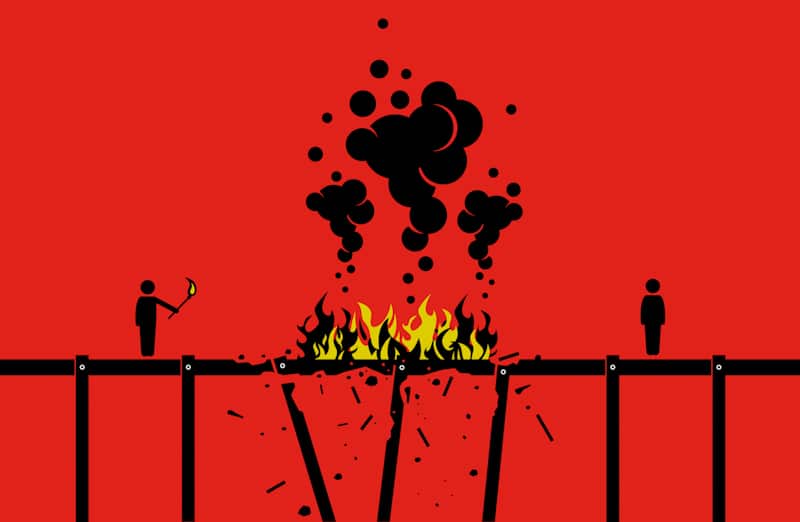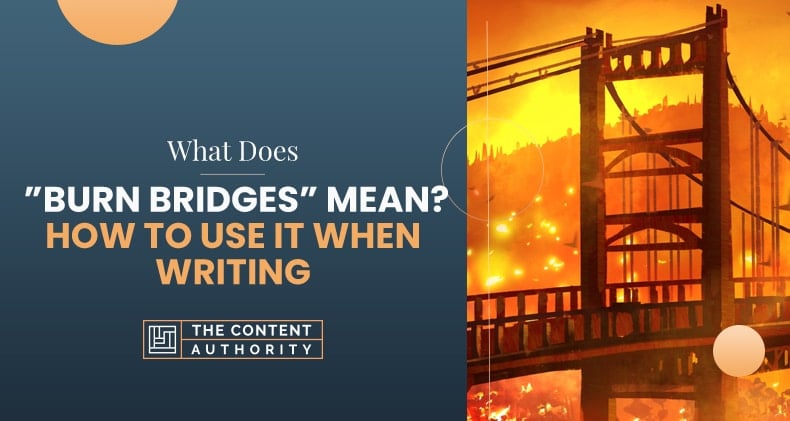Not every person you meet or every situation you are in will confer joy or satisfaction. There are people who you may despise but cannot avoid, and there could be circumstances you may want to bail yourself out of but may not be able to immediately. Regardless of how you choose to sever your ties with an individual or escape a situation, make sure you do it harmoniously, or you do not “burn your bridges”.
The term “burn bridges” means “committing to a path or goal with no return point”. Denouncing your boss’ marketing strategies on the last day of your job is “burning bridges”. The phrase can be altered in texts to suit a given sentence or context, as in “burn your bridges”, “burn one’s bridges”, etc.
If you’re curious about the origin of the term “bridge” in the phrase, want to learn about the phrase’s literal meaning, how to use the expression in texts, or in what contexts, continue reading.

“Burn Bridges” – Meaning
The idiomatic phrase “burn bridges” means “the inability to revert to an earlier state or position”. In other words, “burning your bridges” implies being forced to continue with a specific course of action, with no point of return or the provision to reinstate the original.
The thing you may want to restore to its earlier position could be a relationship or situation. In interpersonal relationships, “burning bridges” means having alienated someone for good. Besides relationships, other things that can have their “bridges burnt” include “path”, “reputation”, “connections”, and “opportunities”.
Generally, the bridges that get burnt or the connections, relationships, etc., that get wrecked are done intentionally, usually rooted in hubris and/or ignorance.
Origin of the Phrase “Burn Bridges”
The idiom “burn bridges” supposedly have their roots in ancient Rome. However, the phrase was not commonly used during those times. The expression entered regular use only during the 1800s.
Like several idioms, this phrase also has a literal origin. In Roman warfare, it was common practice to destroy bridges. At times, the bridges were brought down to prevent enemies from fleeing once they entered the territory. Bridges were damaged not just to stop the enemy’s escape but also to cut their supply lines.
In other instances, bridges were destroyed so that there was no way for a retreat. This means the Roman armies had no option but to fight to victory or death.
Similarly, ancient navies destroyed their boats upon setting foot on enemy shores. The ploy was used as motivation or to serve as a constant reminder that they cannot retreat or had no option but to win the battle. The vessels, of course, were obliterated after everybody on board disembarked.
Though not as popular as “burn one’s bridges”, the phrase “burn one’s boats” has been around for longer than its more famous sibling or is at least more than two decades older than the expression that includes the term “bridge”.
“Do Not Burn Bridges” is Good Advice, Generally
Burning bridges is usually not wise as doing so leaves you one option or recourse. It’s particularly critical to not “burn bridges” in the business world. Contacts and networks propel you in the corporate world, and rubbing on the wrong side of people is pretty much self-inflicted damage.
For example, suppose you are starting your own business and bidding adieu to your current job. In that case, it’s essential to part ways with your existing (soon former) employer on an amicable note. In other words, do not “burn the bridge” between the two of you. Because if things do not work out as planned with your venture, you may feel the need to get back to your old job.
If your position has been filled, you’ll have to look for a job elsewhere. And suppose you were not particularly friendly when quitting your earlier job. In that case, that may have had a ripple effect, or word could have spread about your “unprofessional” behavior, hurting your chances of getting a job elsewhere.
Even if your venture does well or goes as planned, it’s good to have parted ways with your boss on friendly terms. If your own business is in the same line as your previous company, good relationships with your former colleagues could benefit your enterprise.

Phrases Related to “Burn Bridges”
The word “bridges” is used in quite a few idioms or phrases in English, including:
- To bridge over something (to keep going, tide over)
- To bridge the gap (using a non-permanent fix to an issue)
- To build bridges (to better relationships between people or promote friendships)
- A bridge too far (refers to a very ambitious plan or goal)
A couple of phrases, however, not just use the term “bridge” but are also a lot more similar to “burn bridges” in meaning:
- Burn the bridge when it comes
- Cross the bridge when it comes
“To burn the bridge when you come to it” means “anticipating a situation or problem beforehand and functioning in a way that cuts ties or alienates when the need for the same arises”. For example:
- Have you figured out what to do when she comes to know of your secret? Not yet, I shall burn that bridge when it comes.
The phrase effortlessly marries “burn bridges” and “cross the bridge when it comes”.
The saying “cross the bridge when it comes”, on the other hand, has a relatively positive connotation. It means “dealing with a difficult situation or a problem when it happens”. It doesn’t suggest “anticipating difficulties” and springing into action or damage-control before time or being prepared for it. For example:
- Should we talk to our vendors and tell them demand could slightly go down shortly? No, we’ll cross that bridge when we get there.
- The interview is more than a month from now. I will cross that bridge when it comes.
Not to mention, both the phrases can be altered a bit to suit a given text or fit nicely into a sentence. In other words, minor alterations such as “I’ll cross that bridge when it comes/when it arrives” are acceptable.
A few other avatars or inflections of the phrase include:
- Burn one’s bridges (third-person, simple present tense)
- Burning one’s bridges (present participle)
- Burned (or burnt) one’s bridges (past participle, simple past)
Though not similar by words, “wash your hands of” or “wash one’s hands of” is yet another phrase that means something similar.
Other Great Idioms
Example Sentences with “Burn Bridges”
The following are sentences/passages that incorporate the phrase “burn bridges” in different ways:
- Even if you were unceremoniously terminated from your job, it’s wise not to burn your bridges by passing untoward comments on your way out, as there’s always the possibility of meeting your former employer or manager in the crossroads of professional life.
- Keep burning your bridges. You’ll one day be all by yourself.
- Do not burn bridges that you might need to cross later.
- Don’t burn bridges and expect boats to be sent in your direction.
- Breaking up with someone you’ve been dating for years through a text message is insensitive and disrespectful. By doing so, you’ve pretty much burnt the bridges, or your “erstwhile sweetheart” is not coming back into your life again.
- Many people in the business world commit the grave mistake of burning their bridges with no alternate plan in the shed.
- When the troops withdrew from the region, they sure burnt the bridges behind.
- You did not burn bridges by quitting but by insulting your manager in front of everybody. If you had left without hurling the insult tirade, things would have been a lot more cordial.
- She is a bit too young to realize working for the competitor will burn her bridges with her current employer.
- By blowing the road up, the spies burned the bridges behind them.
- If you’re considering quitting your job, do it politely and without creating a fuss. If you choose to vent your anger and frustration at your boss instead, you’re burning your bridges.
- Their friendship was in such a bad state they had no option but to burn the bridges and proceed on their respective paths.
- He burned his bridges and will not be able to return to the place again, at least not with the same manager around.
- To make the troops committed to the battle, the general had no option but to burn bridges behind him. The move was no doubt difficult and risky, but it paid off well in the end.
- Kindly be polite with your critique unless you do not care about potentially burning your bridges with them.

Conclusion
Burning your bridges is never a great idea – be it at the professional front or in your personal life. Quite often, the need to look back and return to the point arises.
However, there can be certain bridges that should be burned – a bridge that takes you back to a state you don’t want to revert to or closer to a thing that’s not desirable. Maybe your earlier day job was horrible, paid minimal wages, and caused you more stress than your current entrepreneurship struggle.
At times, burning bridges affords you the “light” required to move ahead to better things in life.
Shawn Manaher is the founder and CEO of The Content Authority. He’s one part content manager, one part writing ninja organizer, and two parts leader of top content creators. You don’t even want to know what he calls pancakes.

